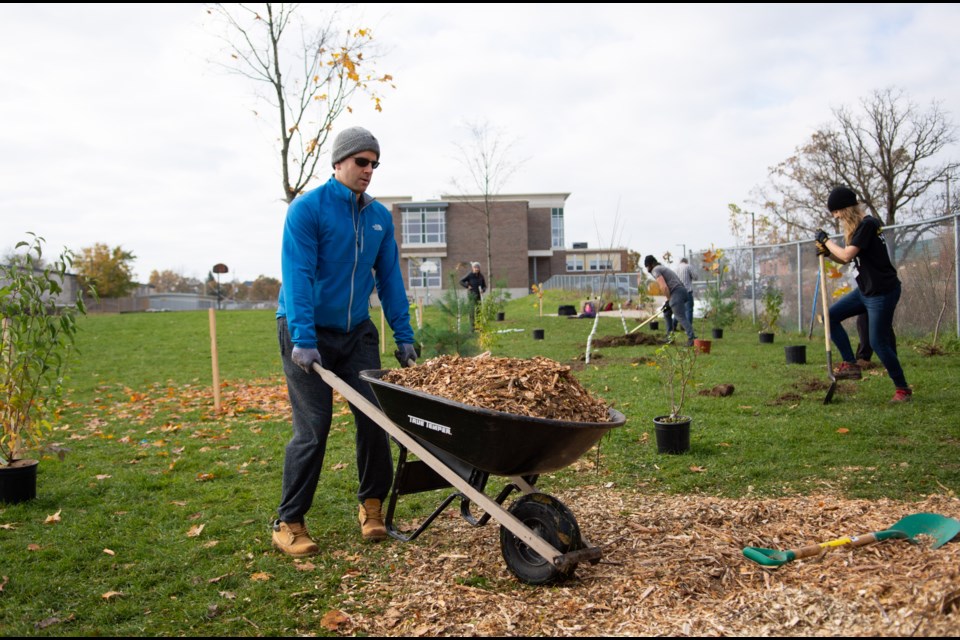Two Cambridge schools will be a little greener this year.
Earlier this month, volunteers planted 170 trees at Avenue Road and Manchester public schools.
As part of a pilot program led by Sustainable Waterloo Region (SWR), the project aims to plant microforests across the region.
SWR, partnered with the Waterloo Region District School Board (WRDSB), Energy+, EY Canada, the City of Cambridge, the Grand River Conservation Authority (GRCA) and the Ages Foundation joined together to bring a natural mini-forest onto the school grounds, a space where children can connect with nature.
“When approached with the idea, and I saw all of these generous donors, I unreservedly said yes,” said Marc Lehmann, principal at Avenue Road Public School.
“In my role here at the school, I am more and more interested in leaving a legacy for the school. This amazing partnership with so many groups have helped create this space, a legacy for future generations.”
Organizers were impressed by how quickly the volunteers got the trees into the ground.
“We had high school students working towards their community service hours out planting, as well some mothers with their children, all out to give us a hand,” said Tova Davidson, executive director of Sustainable Waterloo Region.
According to SWR, the microforesting effort at the two schools will bring new life to these green spaces, and enhance their ability to help fight climate change.
“Greenway-Chaplin Community Centre in Cambridge referred the schools to us. When we asked them both if they were interested in the project, they were excited to take part and volunteers were so eager to help,” says Davidson.
Davidson says adding microforests to urban areas, benefit not only the environment, but everyone.
“When you plant microforests, you are bringing the space back to its natural state and in time, it will become forested. Trees and bushes are planted randomly, just like a natural forest, and with natural tree species,” says Tova Davidson, the executive director of Sustainable Waterloo Region.
Located in urban settings, microforests provide an oasis for plants, insects, birds and small mammals.
Trees and shrubs improve soil and water conservation, store carbon, moderate local climate by providing shade from sun and wind and help regulate temperature extremes.
“Microforests also help with climate mitigation in reducing emissions and climate adaptation, to accommodate our changing climate,” Davidson said.
The schools plan to use the space for outdoor programming.
“We hope this will provide more options to students and staff, but also to all community members,” Lehmann said.
“This is so they too can utilize the space on evenings or weekends. The goal is greater than between the hours of 9 a.m. to 3:20 p.m. This is to support the entire neighborhood.”
Davidson from SWR says that everyone working together has made the project a great success.
“The City of Cambridge provided mulch and the GRCA supplied the trees and helped with planning in terms of which types of trees and bushes to plant,” Davidson said.
Sustainable Waterloo Region is a social enterprise non-profit organization that helps the local business community, and Waterloo Region as a whole, become more environmentally and economically sustainable.
The organization supports the community in a variety of ways to help find the intersection of financial and environmental sustainability. Programs focus on organizational sustainability practices, commuting behaviour, re-generative buildings, community GHG impacts and electric vehicles.
Davidson hopes that microforesting projects are just the beginning of a larger effort coordinated by SWR across Waterloo Region.
“In the future, we hope to get some funding to keep this project going and to be able to help schools, especially those that might have fewer resources,” Davidson said.
“We want to expand this across the region so everyone can benefit.”



